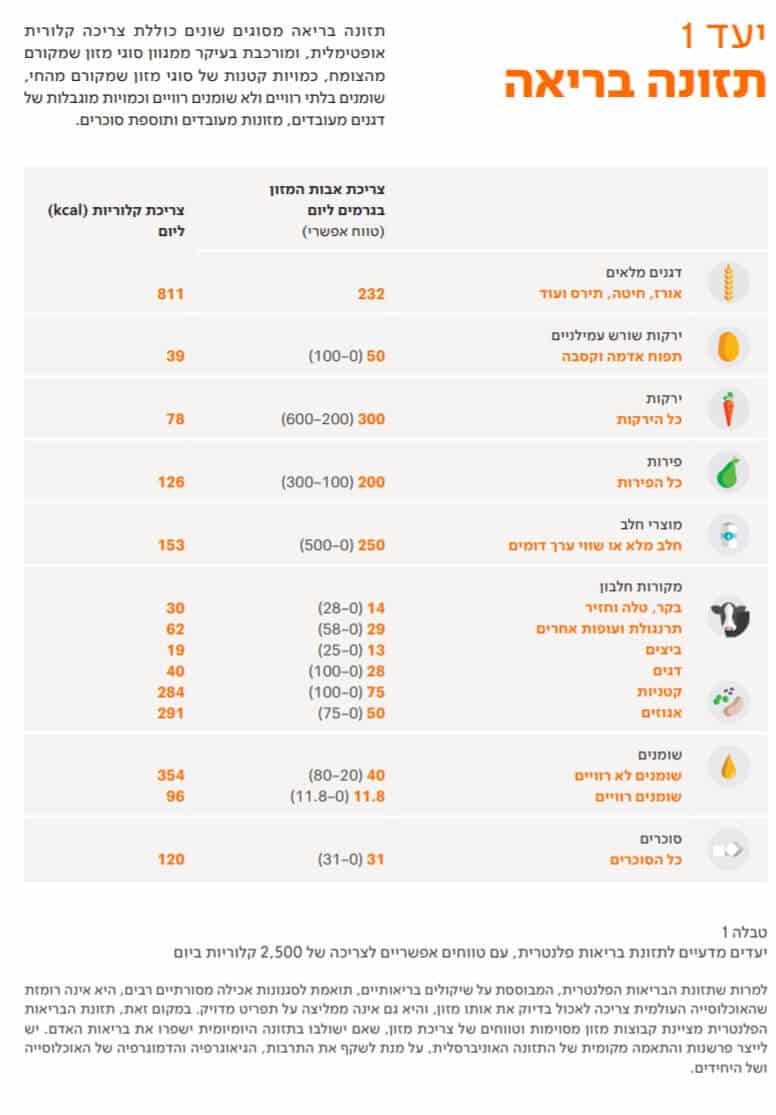A report compiled by a committee composed of experts from various fields was recently published, with a recommendation to change the menu, upgrade the food production system, while feeding a growing population, but taking into account the constraints of the climate crisis. The conclusion is that we need to reduce meat and sugar, but also that governance is needed on the land and in the oceans

The EAT-Lancet report, composed by an international team of experts in various fields - nutrition, agriculture, health, climate, and more, calls for the setting of scientific goals for a healthy diet and sustainable food production, which will make it possible to feed the ten billion people who are expected to inhabit the earth as early as 2050 . A planetary health diet, which emphasizes the crucial role of nutrition in the connection between human health and environmental sustainability, and the need to combine the two, should consist of half of vegetables and fruits; The other half of the plate, shown on the basis of the caloric contribution, should contain primarily whole grains, vegetable protein sources, unsaturated vegetable fats and a smaller proportion of animal protein sources (see table with the recommended intake range of each type of food).
This report was prepared by the EAT, and is an adaptation of the summary of the committee's work "Food in the Anthropocene: The Lancet-EAT Commission on Healthy Nutrition.".
According to the report, the transition to a healthy diet includes doubling the consumption of healthy food types such as fruits, vegetables, legumes and nuts, and a reduction of more than 50% in less healthy food types, such as added sugar and red meat, mainly by reducing excess consumption in rich countries. The factors behind the launch of the report in Israel, the Israeli Forum for Sustainable Nutrition and the Steinhardt Museum of Nature at Tel Aviv University, see the current process as an important step towards a comprehensive discussion on Israel's food systems that will include all the bodies relevant to the issue - agriculture, health , environment and economy - and will advance through public awareness and the awareness and responsibility of policy makers a significant program of sustainable food policy in Israel.
"Planetary" diet
After reading the "Mensher" written by a group of experts I can only add "I said". Because in recent years I have repeated and written about the need to moderate, - not stop - meat consumption, to mainly moderate beef consumption and to switch to a menu that is based mostly - not entirely - on plant products with the addition of a little milk and its products, a little eggs, and also fish, seafood, from time to time Chicken or pork and even a little beef.
Since I am not a nutritionist, my reference to the subject depends only on environmental reasons, that is, which menu causes the least harm to the environment. It is worth remembering that there are many theories that attribute the development of the human race to the inclusion of meat in the menu, thus some explain the growth of the brain that consumes a lot of energy for eating meat, or the structure of the jaws and teeth for the transition to the use of fire for roasting and softening the meat eaten. Added to this is the fact that a vegetarian menu lacks elements that the body needs, for example all the derivatives of vitamin B.
Every time I dared to support eating a little meat or dairy products, I was "attacked" by vegans, I went back and asked the vegans to explain whether rice grown in a field plowed by oxen is "allowed"? Are almonds grown in an orchard fertilized with cow or poultry manure "proper"? Are soybeans grown in areas where old-growth forests were grown "considered"? Of course I didn't get an answer. Now comes a detailed report written by respected professors who wrote a long and reasoned treatise on the diet called "Planetary Diet", or "Planetary Health Nutrition".
The authors of the report call for a global transition to healthy, tasty and sustainable types of nutrition, while moving to double the consumption of plant-based foods and a 50% reduction in red meat (and sugar) consumption, in order to prevent a future in which a significant part of the population will suffer from malnutrition, when up to 2050 it will be necessary to feed a population of 10 billion people.
The report lists the goals of a healthy diet in tables, noting that it is necessary to take into account the populations that feed on animal products.
Next there is an attempt to define the limits of food production beyond which the production will contribute to environmental damage and increase in global warming. To prevent this, it is necessary to switch to sustainable food production, to environmental agriculture that will not harm the environment and will not "contribute" to warming, with the main goals being a global transition to a healthy diet, improved food production methods, reducing food loss and waste.
So much for the needs, how do you do it? The authors have recommendations:
- "Mobilizing commitment to healthy types of nutrition"
- "Transition from bulk food production to healthy food production"
- "Increased and efficient production of high quality food"
- "Instead of expanding agricultural land, restoring depleted land"
- "Improving the ocean interface" to prevent overfishing
- "Reducing food loss and waste"

In conclusion, the authors call for a global adoption of healthy diets from sustainable food systems that will preserve our planet and improve the health of billions of people.
I am more skeptical of supporting all of the goals that were presented and even some of the initiatives and ways to achieve the goals, although in my opinion it lacks reference to the danger of "monoculture", agriculture in which one and the same crop is grown in huge areas, moreover, the authors indicate the changes until 2050 and I claim that : Since we are already on the brink or perhaps already past the point of no return, the recommendations must be implemented immediately.
But since the implementation of the blessed initiative depends mainly on the leaders of countries, those leaders who do not succeed (and some do not even try) to implement the decisions of international bodies to prevent emissions and mitigate global warming, or alternately change the unnecessary, excessive and offensive consumption habits of a significant part of large populations in the West such as the United States XNUMX, South America, Europe and Israel and at the same time a change in food production and consumption habits in countries where extreme poverty and chronic malnutrition prevail.
Despite the need for initiative on the one hand and on the other hand the risk of serious environmental and climatic damage if the proposals are not implemented even partially, being a skeptic it is difficult for me to see how things will change, since the world will continue as usual and "after us the flood"... it's a shame.

Editor's note - due disclosure was lacking
By Avi Blizovsky
At the announcement conference held in Tel Aviv about two weeks ago, some of the speakers said that there is no miracle cure, and that we need a little bit of every possible way to protect the planet and at the same time feed a growing population. However, it gives the impression that the Israeli speakers tried to eliminate even the little bit of meat (and the rest of the animal protein - milk and eggs) that the researchers determined could remain on the menu for zero, contrary to the recommendations of the report itself, thus departing from the report's authors' optimum that it is suitable for both human nutrition and the health of the planet. There was also no reference to the fact that the increase in demand for animal protein would cause an increase in its price so that the poor would not be able to afford it.
Another full disclosure that was required is that since the publication of the original report in January 2019, many critical articles have been written about it in the scientific press, including Blunset himself, and to publish the report in Hebrew a year late without addressing the problems in which it is out of place.
My impression is that everyone who was there is vegan, as well as the food served at the event that took place at the Natural History Museum of Tel Aviv University... not that there is anything wrong with that, just that proper disclosure should have been made. Indeed, there are many problems in the conduct of the meat industry and it needs to be addressed and the suffering of the animals reduced to the minimum necessary. It is also necessary to reduce food production of all types, so that there are no surpluses left to be thrown in the trash, which is against the capitalist concept. Regarding the enforcement - especially in Israel, in order to learn from the experience, you see a group that tries to impose its eating habits on the rest of the public using the name of religion, and exploits any connection with the government. And despite that, you can quite easily find non-kosher food. I personally believe that it is impossible to make such a big revolution in such a short time, at least from the consumer's point of view, while the governments should carry out large parts of the report as part of the fight against the climate crisis and take care of diversified and healthy agriculture.
Scientific criticism of the report which was also published in the Lancet magazine. A study funded by the Bill and Melinda Gates Foundation and led by economist William Masters from the School of Nutrition Sciences and Nutrition Policy at Tufts University in the United States, which examined food prices and foreign wages in 159 countries according to the latest known comprehensive figure - from 2011, and reveals that for 1.58 billion Humans, most of them in sub-Saharan Africa, and in South Asia, the cost will be higher than the average daily income per capita.
More of the topic in Hayadan:

6 תגובות
A plant-based diet is the healthiest for a person, as has already been proven in the blue areas of the world, where there are the most men and women over the age of 100, (consume 95% of plants once a week for a 90-gram portion of meat).
A figure that cannot be argued with, and we also found this in other studies that examined Yemenis in Yemen, for example, who only suffered from bacteria and viruses.
(They also consumed mainly plant nutrition)
There is much to expand on regarding the prevention of chronic diseases and sometimes even healing, among them: heart disease, cancer, diabetes, vascular diseases, Alzheimer's, obesity, multiple sclerosis, osteoporosis, osteoarthritis, viral hepatitis and I will not expand on how the diseases are caused and how food kills or relaxes. But in short it moves in an oxidative stress pathway, inflammation.
However, a few comments to the point:
1. Anyone who consumes a plant-based diet for health reasons and not for 'humane' reasons and makes sure to consume legumes certainly does not lack B vitamins, and it is easy to look at the nutritional values table to see that I am right.
2. Vegans/vegetarians do not lack protein as has been proven by research (see Dr. Michael Greger's website), certainly in light of the fact that the human body consumes (for an average person) about 50 grams of protein, excess protein, on the other hand, contributes to many types of cancer, for example in the methionine pathway, apart from breast cancer .
3. The only thing that a vegan lacks is vitamin B12, since in Israel today they are hygienic and the water is purified, in unhygienic populations bacteria were found that produce B12 in the absorption area.
Those who have earned and have the knowledge have earned, and those who live according to what the pharmaceutical companies have dictated to nutritionists/doctors will continue to suffer from symptom suppression instead of truly curing the disease.
While in Israel heart diseases are number 2.
In Uganda, heart disease is less than one in a thousand, and it's not because of the genes.
In general, I think that man is adapted to eating meat. But the meat sold today is meat contaminated with so many toxins that eating meat is simply nutritional predation, unless you raise the cow in your backyard and let it graze on grass.
I don't know what is good for the earth. What is good for the individual is eating foods that are processed as little as possible, that ingredients have not been removed from it and ingredients have not been added to it.
One who does not know
Who do you believe?
I don't know to what extent it is possible to withstand such a diet these days, with all the abundance.
But I was disturbed by 2 words in the article.
In all my days and not in all "my days"
A point of no return and not a point of "on return"
Maybe there is more... and I didn't notice.
In any case, an interesting article in itself.
Why encourage Israelis to eat pork? Wicked!!!!
Liar politicians and scientists are the same today. I don't believe a scientist's word. Everyone is playing in their own feces... nothing has changed except that a few more people have become rich and famous.